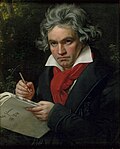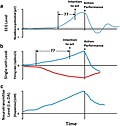The problem of mental causation is a conceptual issue in the philosophy of mind. That problem, in short, is how to account for the common sense idea that...
22 KB (2,696 words) - 20:19, 7 April 2025
not in terms of efficient causation but in terms of final "causation". One problem with this approach is that the two forms of causation do not have to...
38 KB (4,901 words) - 20:18, 22 May 2025
Panpsychism (redirect from Combination problem)
that theories of consciousness should be capable of providing insight into the brain and mind to avoid the problem of mental causation. If they fail to...
87 KB (9,735 words) - 20:39, 19 April 2025
banner of the 'mind–body problem'. Philosophers David L. Robb and John F. Heil introduce mental causation in terms of the mind–body problem of interaction:...
63 KB (7,754 words) - 18:27, 6 May 2025
fact properties of a single substance, thereby prefiguring the modern perspective of neutral monism. The problem of mental causation is also discussed...
21 KB (2,473 words) - 19:57, 11 April 2025
perspective? What, if anything, is the function of consciousness? Problem of mental causation: How exactly do mental states cause intentional actions to happen...
11 KB (1,256 words) - 13:46, 11 March 2025
Free will (redirect from Problem of free will)
early treatise about the freedom of will by Augustine of Hippo Free will theorem Locus of control Problem of mental causation Prospection Superdeterminism...
208 KB (25,556 words) - 03:00, 22 May 2025
biology Mind–body problem Phenomenalism Philosophy of self Primary–secondary quality distinction Problem of mental causation Problem of other minds Vertiginous...
110 KB (12,798 words) - 20:57, 10 May 2025
determinism Free will theorem Locus of control Problem of mental causation Chiang, Ted (July 2005). "What's expected of us". Nature. 436 (7047): 150. Bibcode:2005Natur...
3 KB (267 words) - 14:36, 17 May 2025
Vertiginous question (category Mind–body problem)
self does not exist. Centered world Further facts Indexicality Problem of mental causation Subjective idealism Metaphysical subjectivism Subjectivity and...
9 KB (954 words) - 15:37, 18 May 2025
Artificial Intelligence Frame problem Hard problem of consciousness Neural coding Philosophy of perception Problem of mental causation Symbol grounding Vertiginous...
53 KB (6,825 words) - 20:54, 22 May 2025
Epiphenomenalism (category Mind–body problem)
Epiphenomenalism is a position in the philosophy of mind on the mind–body problem. It holds that subjective mental events are completely dependent for their...
23 KB (2,831 words) - 20:03, 2 May 2025
Links between creativity and mental health have been extensively discussed and studied by psychologists and other researchers for centuries. Parallels...
48 KB (5,559 words) - 18:46, 22 May 2025
philosophy, downward causation is a causal relationship from higher levels of a system to lower-level parts of that system: for example, mental events acting...
4 KB (457 words) - 06:22, 31 October 2024
The Diagnostic and Statistical Manual of Mental Disorders (DSM; latest edition: DSM-5-TR, published in March 2022) is a publication by the American Psychiatric...
111 KB (12,846 words) - 11:42, 15 May 2025
Evolutionary argument against naturalism (category Arguments for the existence of God)
Philosophy of mind Problem of mental causation Skepticism Theism Beilby(2002) p vii Victor Reppert, C.S. Lewis's Dangerous Idea, In Defense of the Argument...
37 KB (4,938 words) - 04:14, 21 May 2025
The Anxious Generation (redirect from The Anxious Generation: How the Great Rewiring of Childhood is Causing an Epidemic of Mental Illness)
correlation of rising social media use and mental health problems might reflect reverse causation. Odgers wrote: First, this book is going to sell a lot of copies...
19 KB (2,074 words) - 07:01, 10 April 2025
nocere Principle Principle of double effect Private language argument Problem of induction Problem of mental causation Problem of other minds Prohairesis...
11 KB (821 words) - 01:35, 27 March 2025
philosophy of mind, although a number of other issues are addressed, such as the hard problem of consciousness and the nature of particular mental states...
96 KB (12,162 words) - 16:00, 25 April 2025
E. J. Lowe (philosopher) (category Academics of Durham University)
E. J. (2006). "Non-Cartesian Substance Dualism and the Problem of Mental Causation". Erkenntnis. 65 (1): 5–23. doi:10.1007/s10670-006-9012-3. Lowe, E...
15 KB (1,582 words) - 20:46, 10 May 2025
Sydney Shoemaker (category American philosophers of mind)
his view of properties as clusters of conditional causal powers. He also applied his view of properties to the problem of mental causation. He also distinguished...
9 KB (692 words) - 12:19, 24 March 2025
Neuroethics § Neuroscience and free will Problem of mental causation Self-agency Thought identification, through the use of technology Unconscious mind Schurger...
99 KB (12,736 words) - 18:11, 8 May 2025
Causation is the "causal relationship between the defendant's conduct and end result". In other words, causation provides a means of connecting conduct...
31 KB (4,904 words) - 10:51, 16 May 2025
Mind–body dualism (redirect from Dualism in the Philosophy of Mind)
In the philosophy of mind, mind–body dualism denotes either that mental phenomena are non-physical, or that the mind and body are distinct and separable...
99 KB (12,285 words) - 23:27, 17 May 2025
being fundamentally incompatible. Free will Neuroscience of free will Problem of mental causation Self-efficacy True Will Volition (psychology) See also...
22 KB (2,664 words) - 03:18, 22 March 2025
Jaegwon Kim (category Fellows of the American Academy of Arts and Sciences)
work on mental causation, the mind-body problem and the metaphysics of supervenience and events. Key themes in his work include: a rejection of Cartesian...
17 KB (1,775 words) - 15:04, 23 April 2025
Nancey Murphy (category University of California, Berkeley alumni)
Philosophia: Rivista Internazionale de Filosofia. 2002. "The Problem of Mental Causation: How Does Reason Get Its Grip on the Brain?" Science and Christian...
14 KB (1,652 words) - 00:24, 6 May 2025
classification of mental disorders, also known as psychiatric nosology or psychiatric taxonomy, is central to the practice of psychiatry and other mental health...
53 KB (6,222 words) - 22:15, 22 May 2025
family services and mental health counseling. Psychiatrists - physicians who use the biomedical model to treat mental health problems - may prescribe medication...
69 KB (7,755 words) - 22:30, 7 May 2025
Drift hypothesis (category Social problems in medicine)
opposing theory of the social causation thesis, which says being in a lower social class is a contributor to the development of a mental illness. A study...
5 KB (712 words) - 09:06, 24 February 2024






